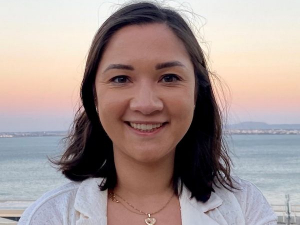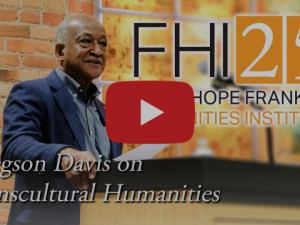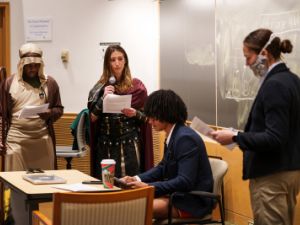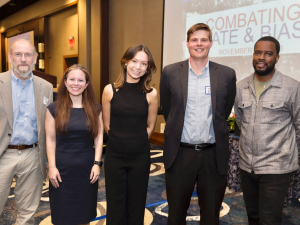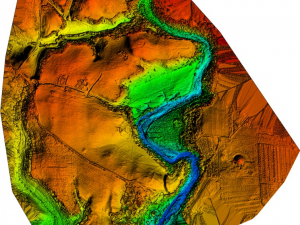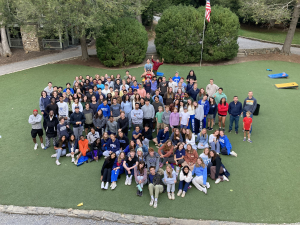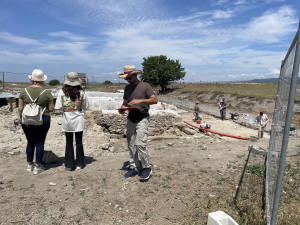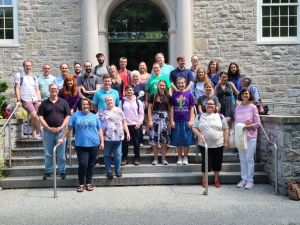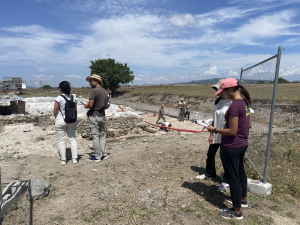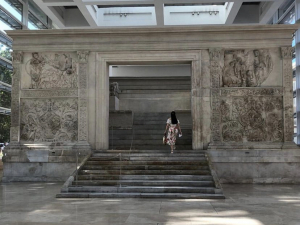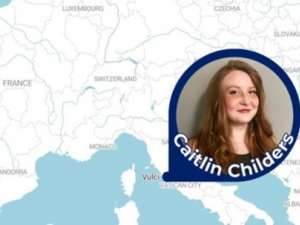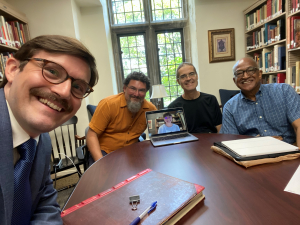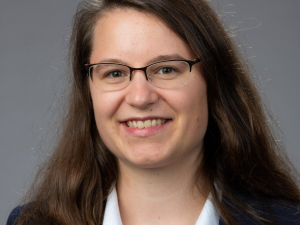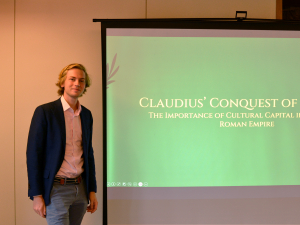Thanks to the Classical Studies department’s Research Travel Award, I was able to complete the 2024 Postgraduate Epigraphy Course at the British School at Athens (BSA) in Greece. Dr. Peter Liddel and Dr. Polly Low taught the class, covering all of the need-to-know topics for understanding epigraphy and incorporating it into research, and all over a period of just 10 days. One portion of the program focused on lecture-style sessions for learning about the history of epigraphy, how to work on it, and why it’s important to do… read more about Tara Wells: Postgraduate Epigraphy Course at the British School at Athens »
This summer, I was fortunate enough to participate in the Summer Session at the American School for Classical Studies in Athens with the help of travel funding from Duke’s Department of Classical Studies. The ASCSA Summer Session is a six-week program in which students travel throughout Greece visiting archaeological sites, monuments, and museums from Crete up to Thessaloniki. My nineteen peers and I, under the leadership of Professors Amy C. Smith (University of Reading) and Amelia Brown (University of Queensland), were… read more about Emma Glen: American School for Classical Studies Summer Session »
Anna at Paestum This summer, a research travel award enabled me to participate in the Classical Summer School at the American Academy in Rome. In the program, I spent five weeks living in Rome with a group of graduate students and teachers, visiting museums and archaeological sites in the city and the surrounding area. I was able to have firsthand experience of the aspects of the city’s material culture and architecture I’ve only read about or seen in photographs. Being there in person… read more about Anna Cambron: Roman Life and Material Culture »
Phoenician Graves by the Sea, Cádiz I am very grateful for the department’s travel funding, which enabled me to travel to Spain. I was based in Madrid, where I took intensive Spanish classes and began my doctoral research. I am pleased to say that I was able to progress quickly through the beginning stages of the Spanish language. My ability to read Spanish academic articles, monographs, and other publications increased by leaps and bounds, which will prove fundamental to my future… read more about Andrew Welser: Early Dissertation Research and Language Training in Spain »
Hello, I wanted to take a moment to introduce myself and express how excited I am to start at Duke Classical Studies. It is an opportunity to return to my academic roots and be surrounded by ancient history and archaeology once again. Excavating in Macedonia I studied Classics and Archaeology at Johns Hopkins University, completing my undergraduate thesis on Etruscan burial patterns under Herica Valladares (now at UNC-Chapel Hill) and Emily S.K. Anderson. My fieldwork experience took… read more about Meet our new Program Coordinator, Nicole Coscolluela! »
Tori Lee ('22 PhD), current Postdoctoral Fellow at Boston University, was recently awarded the 2024-2025 Women's Classical Caucus (WCC) Leadership Award for her commitment to creating a diverse and inclusive environment within academia. While at Duke, Tori co-founded the diversity committee in the Classical Studies Department and led discussions for its anti-racist reading group. Read more about Tori HERE and the prize announcement HERE. read more about 2022 PhD Tori Lee Wins Women's Classical Caucus Prize »
In Spring 2024, FHI 25 kicked off with a series of conversations engaging some of the most significant humanities scholars of our time – all formerly or currently affiliated with Duke University – to historicize the University's significant investment in the humanities in the 1980s, reflect on what such investment made possible alongside national and international developments in the field, and propose future directions of humanities scholarship and teaching within and beyond Duke. Watch Dr. Gregson Davis' talk HERE… read more about FHI at 25: Gregson Davis, "Towards the Flourishing of 'Transcultural Humanities'" »
Lauren D. Ginsberg, associate professor of Classical Studies and an expert on Ancient Rome, answers the internet's burning questions about the Roman Empire. What did Romans snack on in the Colosseum? Why does Ancient Roman concrete differ from modern forms of concrete? Did gladiators really fight lions? This Roman expert answers all these questions and much more with WIRED's Tech Support. read more about Classicist Lauren Ginsberg Has Answers to Your Roman Empire Questions »
Professor Jed Atkins spoke on "Fostering Transformative Conversation Across Difference" along with panelists from Braver Angels, Duke Library, UNC, and UC-Boulder for the conference “Combating Hate and Violence,” Polis: Center for Politics, Duke University, November 5, 2023. read more about Jed Atkins, “The Unifiers: Fostering Transformative Conversation Across Difference” »
This week the Society for Classical Studies featured the work of our recent PhD student, Sinja Küppers, in a post titled: "Women in Roman Higher Education: Marginal(ized) Learners, Teachers, and Intellectuals." Read more about her work and future plans here! https://classicalstudies.org/scs-blog/torilee/blog-women-roman-higher-education-marginalized-learners-teachers-and-intellectuals read more about Küppers featured on the SCS Blog: Women in Roman Higher Education: Marginal(ized) Learners, Teachers, and Intellectuals »
During the summers of 2016 and 2017, a series of Unoccupied Aircraft System (UAS, aka drone) missions were flown over the Vulci plateau, an archaeological relevant site near Rome, Italy. The city of Vulci played a prominent role in Italian history and remains a pivotal piece in understanding the physical and social changes that occurred for both Etruscan and Roman cultures between ~9th century BCE and the ~4th century CE. Given the temporal and financial costs of conducting traditional archaeological excavation on a city-… read more about Vulci 3000: Multispectral drone for the reconstruction of Etruscan landscapes in Italy »
The Duke Chronicle recently profiled Duke's Transformative Ideas Program, led by Classics professor Jed Atkins, and its Living-Learning Community, co-led by Classical Languages Major Jason Murray, Jr. See here: https://www.dukechronicle.com/article/2023/10/duke-university-transformative-ideas-interdisciplinary-program-sophomores read more about Transformative Ideas in the Duke Chronicle »
Thanks to the generous travel funding provided by the department, in the final weeks of summer 2023, I had the amazing opportunity to participate in an archaeological field school in the Alentejo region of Portugal at a Bronze Age site known as Castelo, under the direction of Bianca Viseu (McMasters University), Rui Mataloto (University of Lisbon), and Gonçalo Bispo (University of Lisbon). Castelo is a large mountain site, only a small portion of which has been uncovered so far. This season, the goal at the site was to… read more about Jess Cruz-Taylor: Archaeological Field School, Redondo, Portugal »
Thanks to the research travel funding from the Classical Studies Department this summer, I was able to conduct research that seamlessly combined my two academic interests of neuroscience and visual studies through the Vulci 3000 Project. As a Neuroscience and Visual Media Studies double major, I had no previous experience in archeology or classical studies, but was able to meaningfully contribute to the initiative through conducting several psychological experiments. Over the course of 2 weeks, my labmates and I were able… read more about Srinjoyi Lahiri: Neurocities and Ruinscapes - Vulci 3000 Project »
The program in which I participated through a grant given by the Classics Department at Duke was called Summer School in Homer. This was a one-week course on all things Homer located in Chios, Greece which is rumored to be the birthplace of Homer (if he did in fact even exist). The course was designed around interpreting Homeric Greek mainly from the Odyssey, and making connections to various themes and works of art from all time periods. We had many lectures covering topics like reception of Homer in ancient philosophers… read more about Aadesh Anchaliya: Homeric Greek in Chios, Greece »
This summer I participated in the Dickinsoniense Conventiculum, which was an immersive spoken Latin experience. The program itself was held at Dickinson College—a small liberal arts college in Carlisle, PA. The Conventiculum was five days long and a true test of the skills I had learned so far at Duke. The program opened with a dinner, which was the last time I spoke English with the participants for the rest of the week. Most of the participants were teachers in high schools near D.C., with me being the only undergraduate… read more about Christian Ellis: Latin Conventiculum-Immersive Spoken Latin »
For summer 2023 I had the opportunity to participate in an excavation at Pompeii, the Pompeii I.14 Project supported by Tulane University and directed by Dr. Allison Emmerson. I joined the project as a ceramics specialist and had a wonderful experience as a member of the project. My work focused on sorting and documenting the many potsherds found on site. It was very rewarding to be able to build on my previous experience working with ceramics as well as gain new knowledge and become deeply familiar with the site’s pottery… read more about Tara Wells: The Pompeii I.14 Project »
With the aid of the Research Travel Award, I was able to travel to Italy this summer to participate in data collection for Dr. Maurizio Forte’s Neurocities and Ruinscapes Bass Connections team, as part of the Vulci 3000 Project. Our work was primarily based in the archeological site at the Etruscan and Roman city of Vulci, though we did additional experiments in Rome. The main goal of the summer work was to collect eye-tracking data using the Pupil Invisible glasses, which will later be used to create a virtual… read more about Sidney Jordan: Neurocities and Ruinscapes Bass Connections Project »
This summer I participated in the Living Latin in Rome organized by Paideia Institute. LLIR is an intensive program conducted almost exclusively in Latin. This year’s theme was Horace’s poetry. In seminar-style daily meetings we read and discussed Horace and the relevant cultural and historical material in Latin. In the afternoon we explored the archaeological sites and museum. These tours—and oftentimes lectures—were also in Latin and included additional readings and activities in Latin. The readings featured a diverse… read more about Mariami Shanshashvili: Horace and Living Latin in Rome »
Hello! I am Caitlin Childers and I’m originally from Gaffney, South Carolina. I’m a first-year Master's student, focusing on Digital Art History. I am spending two weeks as project manager on a Bass Connections project called Neurocities and Ruinscapes. We are at an archaeological site called Vulci in Rome, working on data collection. It’s an Etruscan site, and I’ll be working with my professor, Dr. Maurizio Forte, and two undergrads and learning more about the site itself. My interest in the project is informed by my goal… read more about Caitlin Childers: Neurocities and Ruinscape: Eye Tracking Experiments »
I am grateful for the department’s travel funding, which enabled me to travel to Cyprus for an archaeological excavation, and to go to Turkey to observe important archaeological sites in-person. In Cyprus, I helped investigate Kalavasos Vounaritashi, an Iron-Age site in the middle-south of the Island. This rural site is the first of its kind to be investigated in Cyprus. Our five-person team, led and directed by Dr. Catherine Kearns (Chicago) aimed to uncover another section of the site in order to better understand its use… read more about Andrew Welser: Vasilikos Valley Project »
Congrats to Alex Karsten for successfully defending his dissertation last week. His dissertation title was The Theognidea in Reperformance: A Rhetorical Rereading. Well done Dr. Karsten! read more about Alex Karsten successfully defends his dissertation »
Congrats to Sinja Küppers for successfully defending her dissertation today! Her dissertation title was Marginalized Voices and Nontraditional Pathways in Higher Education in the Late Roman Empire. Well done Dr. Küppers! read more about Sinja Küppers successfully defends her dissertation »
Congratulations to our CLST Class of 2023! Classical Civilizations Major Abong’o Adongo Eric Johannessen David Mellgard Jr. Amanda Turner IDM: Classical Studies/History Tyler Donovan Classical Civilizations Minor Alexandra Brice Zachary Burd Greek Minor Greg Orme Latin Minor Anneke Zegers Graduation with Distinction & Awards David Mellgard Jr. - High Distinction David Mellgard Jr. - David Taggart… read more about Congratulations to our CLST Class of 2023! »
This past Thursday, April 27th, Class of 2023 CLST graduate, David Mellgard, presented his Senior Honors Thesis titled, "Claudius' Conquest of Britain: The Importance of Cultural Capital in the Early Roman Empire." David Mellgard with his advisor, Professor Boatwright (Emerita), at the presentation of his Senior Honors Thesis. David Mellgard, Class of 2023,… read more about David Mellgard (BA '23) presents Senior Honors Thesis »






